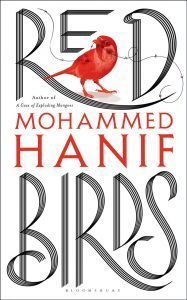Shahnaz Siganporia in Vogue:
 ‘Red Birds’ marks the award-winning British-Pakistani author’s return to fiction after seven years, and is a potential instant classic.
‘Red Birds’ marks the award-winning British-Pakistani author’s return to fiction after seven years, and is a potential instant classic.
“We used to have art for art’s sake; now we have war for the sake of war” reads a line from Mohammed Hanif’s latest novel, Red Birds. Writers have relentlessly written about war, and Hanif’s latest will probably go on to join the best in this canon. His is a satire of our age—of money-making schemes in forgotten camps, electrocuted mongrels, lost men, and the women left behind in asymmetrical wars. It’s specific, relevant to the violence we know in headlines and hashtags, but generously buttressed in the universal absurdity of life and death. Witty, eviscerating in its irony and sneeringly insightful, this novel is packed with what we’ve come to recognise as Hanifian trademarks. A recommended read of the season, the writer and journalist shares his experience of writing this novel, battling censorship and understanding his feminist gaze.

Of all the characters in Red Birds, a large chunk of the narrative is by Mutt. What made you light up the narrative from the point of view of a dog?
Like most people who spend a lot of time around dogs, I tend to talk to them occasionally. And then sometimes they talk back, if not through words, through their gestures, humps and licks. Municipalities around many places in the world carry out a cull of stray dogs for public safety. It’s a bit like powerful countries always having the need to have a war at a distant place that makes them feel safer in their suburban homes. I often think that if dogs ran our cities we might be better off. I was really reluctant to give Mutt a voice, but he insisted. In the end, Mutt gets what he wants or dies trying.
More here.
